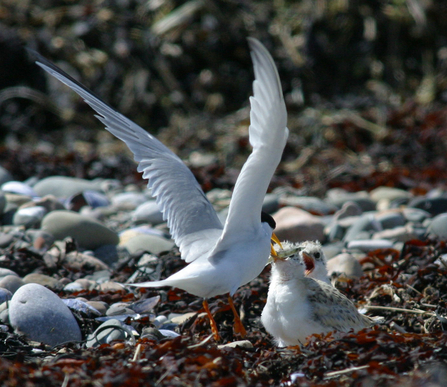
Little tern feeding chicks at Foulney Island Nature Reserve © J Sheldon

Little tern feeding chicks at Foulney Island Nature Reserve © J Sheldon
On our Foulney Island Nature Reserve off the coast of Barrow-in-Furness, we recorded 49 pairs of little terns which raised 13 chicks and 43 pairs of Arctic terns which raised 9 chicks. This was despite storm conditions early in the breeding season which sadly destroyed many of the nests – thankfully some of the terns re-laid eggs to give a surprisingly successful year.
The RSPB had a record-breaking number of 1,950 pairs of Sandwich terns at their Hodbarrow reserve near Millom. This is an increase from the previous record of 550 pairs last year, and they raised 525 chicks. The site also recorded 11 pairs of little terns, raising 10 chicks and 60 pairs of common terns raising 22 chicks.
Sarah Dalrymple, South Walney Warden said: “It’s been a challenging year for the terns at Foulney Island. Sadly storms early on in the breeding season resulted in many of the nests being destroyed. However, nature is remarkable and several of the adults re-laid their eggs, giving us a surprisingly successful season, despite the weather. These delicate white seabirds really are incredible. Arctic terns migrate from Antarctica to the UK each year to breed, while little terns are our second rarest seabird, so it is a real privilege to have them here, and doing well in Cumbria.”
Mhairi Maclauchlan, Warden at RSPB Hodbarrow said: “We are delighted with another successful breeding season for terns in Cumbria. Generally, tern populations like many seabirds, are sadly struggling. Their preference for nesting on beaches means disturbance from human recreation often causes them to abandon their nest sites. They are also susceptible to stormy weather and predation affecting their numbers, as we have seen this year. Staff and volunteers from the partner organisations have worked around the clock to protect these terns, so it is massive thanks to their dedicated efforts that these elegant seabirds have done well. We’re always looking for volunteers to help monitor these birds, so if you’d like to get involved, we’d love to hear from you – hodbarrow@rspb.org.uk”
Several of the young terns at Hodbarrow and Foulney Island were ringed with coded, coloured rings – a scientific method whereby birds are fitted with light-weight, coloured, individual identification rings on their legs - to help monitor their movements without the need to re-catch them. These birds spend the winter in Africa, returning to Europe to breed, so the rings provide important information. Some of this year’s adults were ringed as chicks, and staff and volunteers from the RSPB were able to identify that they had been ringed in places like North East Scotland, Wales and even Spain and Holland.
Bart Donato, Lead Advisor for Natural England in Cumbria, who ringed some of this year’s tern chicks said: “Turning around the fortunes of the four tern species that come to breed in Cumbria has taken a lot of commitment on the parts of the RSPB and Cumbria Wildlife Trust over the past few years, and it’s been great to see so many young terns fledging this year, despite some challenging conditions on the beaches. Ringing the terns allows us a window to understand them as individuals for the rest of their lives and it’s really pleasing to have already had a number of ‘our’ babies seen in North Wales, having successfully completed the first leg of their epic journey that will take them to Southern Africa.”
As one of the UK’s rarest seabirds, this project to help the recovery of little terns will continue to be funded thanks to £20,000 of EU Life money. Along with £33,000 funding from Natural England towards tern conservation in Cumbria, this will enable the RSPB and Cumbria Wildlife Trust to carry out important habitat work this winter, to improve the breeding sites for Cumbrian terns, ready for next season.
More about Foulney Island Nature Reserve More about RSPB Hodbarrow
Little terns are our second rarest seabird, so it is a real privilege to have them here, and doing well in Cumbria.Sarah DalrympleWarden, South Walney Nature Reserve